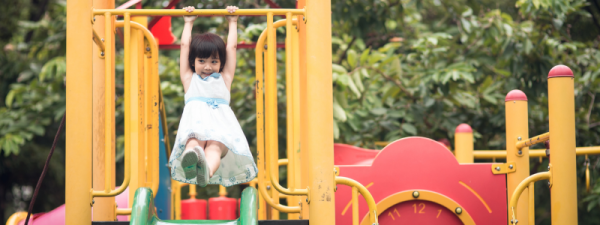EMBRACING THE THRILLS OF RISKY PLAY FOR INFANTS AND TODDLERS
14.5.2024

Climbing trees and exploring the outdoors are long seen as child’s play. These types of ‘risky play’ can also benefit children’s mental, social and physical development.
What is risky play? Risky play is a way of describing play that has some risks attached to it and is exciting for infants and toddlers.
“Risky play allows children to experience vital emotions such as: hesitation; excitement; fear and joy. We can use risky play to encourage children’s ability to judge a situation and activity they are in,” says Taylor Kamuhemu, Play Systems Advisor at CLM Community Sport.
While there should be always be adult supervision, giving children more opportunities to learn through play can be empowering for them while supporting natural curiosity.
What is considered risky play is different for each child and depends on how confident they are in their skills.
“Adults should be supportive of children as they try new things, encouraging them to push themselves as long as they are comfortable.”
For infants, risky play could involve crawling around to explore, as opposed to being carried.
To avoid serious risks, adults should be aware of hazards in the play environment and intervene if the potential harm is more serious than what a child can manage.
“It’s important for adults to understand the difference between a risk and a hazard,” says Taylor. “A risk is a challenge that a child can learn to recognise and determine for themselves whether to engage with it or not. A hazard is a danger in the environment that can result in a serious injury.”
Adults empowering infants and toddlers to take part in risky play builds trust and will support children in achieving their goals.
For children in your care who are climbing high, swinging far or rolling fast, try these phrases to encourage awareness instead of saying “be careful”:
- “What is your plan to get down?”
- “Try using your arms.”
- "Notice how the rocks are bumpy."
- "Do you see the tree roots sticking out?"
For ideas on how to encourage more risky play, download the free resource developed by CLM Community Sport.
CLM Community Sport
For health advice call Healthline for free anytime on 0800 611 116
Resources
- All
- Alcohol
-
ARPHS translated resources
- Fact sheet - Typhoid and Paratyphoi…
- Fact sheet - VTEC/STEC (Samoan)
- Fact sheet - Dengue fever (Samoan)
- Fact sheet - Dengue fever (Tongan)
- Fact sheet - Dengue fever (Fijian)
- Fact sheet - Dengue fever (Cook Isl…
- Fact sheet - Hepatitis A (Samoan)
- Fact sheet - Hand washing and hygie…
- To view more click here
- Clinical pathways
- Dengue fever
- Early childhood education centres
- Hand hygiene
- Hazardous substances
-
Healthy Active Learning
- Weaving in culture for happy and en…
- Food for thought - learning from 5+…
- Planting seeds - growing St Mary's …
- Awesome mealtimes at Awesome Kiwis
- Embracing the thrills of risky play…
- Water play on a summer's day
- Flourish with nourishing celebratio…
- It’s not kindergarten without a gar…
- To view more click here
- Hepatitis A B C
- Influenza - The Flu
- Influenza-Like Illness
- Lead and lead poisioning
- Legionellosis
- Malaria
- Measles
- Meningococcal
- Monthly promotions
- Mumps
- Norovirus
- Organisational
- Rheumatic Fever
- Rotavirus
- Shigellosis
-
Submissions
- NPHS Northern Region Submission - A…
- Submission: Kaipara District Counci…
- Submission: Far North District Coun…
- Submission: Whangārei District Coun…
- Submission: Auckland Council Long-T…
- Submission: Auckland Integrated Tra…
- Submission: Annual Budget 2023-2024
- Submission: Smokefree Environments …
- To view more click here
- Tattooing
- Travelling
- Tuberculosis
- Typhoid and paratyphoid
- Vaccinator authorisation
- VTEC/STEC
- Water
- Whooping cough - Pertussis
- Yersiniosis